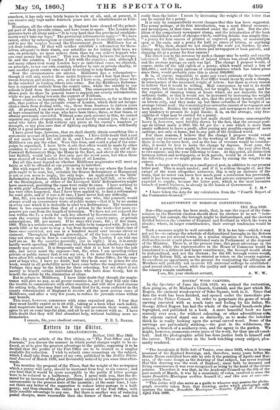Vitus to tit Ran.
POSTAL ARRANGEMENTS.
Belfast, 15th May 1860. Sin.—In your article of the 21st ultimo, on " The Post Office and the Journals," you discuss the manner in which postal charges ought to be re- duced, so as to give the greatest advantage to the public, supposing it to be decided that the profits of the Post Office are to be treated as a surplus available for reduction. I wish to submit some reasonings on the subject, which I shall take from a paper of my own, published in the Dublin Statis- tical Journal of March 1859, and favourably noticed by you some time after- wards.
You mention the proposal of the Times, that the weight of the newspaper which a penny will carry, should be increased from four to six ounces ; and you hint that it would be more acceptable to the public if letter postage were to be reduced to a halfpenny. Now, I agree with you, that the de- mand for an increase of the great privileges enjoyed by newspapers is quite unreasonable in the present state of the question ; at the same time I can- not think any better of the suggestion to reduce letter postage to a half- penny, and thus abandon the entire net revenue of the Post Office, with little sensible advantage to any one. But there is another way of reducing postal charges, more reasonable than the former of these two, and less
costly than the latter : I mean by increasing the weight of the letter that can be carried for a penny.
It is only by comparatively recent changes that this has been suggested. The penny postage, at its first introduction, was a most liberal measure ; and newspapers, at that time, remained under the old law. But the abo- lition of the compulsory newspaper stamp, and the introduction of the book post, established a scale of charges which, omitting details. was simply this :
‘ a penny for four ounces of printed or engraved papers, or manuscripts open at the ends, and a penny for half an ounce of letters, or anything else." Why, then, should we not simplify the scale yet further, by abo- lishing any distinction between letters and newspapers or book parcels, and charging all at a penny for four ounces ?
The direct loss to the revenue by such a change may be easily and exactly 'calculated. In 1857, the number of inland letters was about 584,000,000, and the average postage en each was lid. The change Ipropose would, of course, strike off the odd eighth of a penny, which would- entail a loss of 262,5001.; and the rapid increase of correspondence which has taken pleas since then, would probably raise this to about 300,000/. It is, of course, impossible to make any exact estimate of the increased expense, which the working of the Post Office would incur by such a change, in consequence of the increased weight of letters : but there is every reason to believe that it would be trifling. Mail conveyance by rail is no doubt very costly, but this cost is incurred, not for weight, but for speed, and for the expense of running trains at hours which are not desirable for the ordinary traffic, so that it would not be increased by increasing the weight of the mails. It is to be observed, also, that the proposed change would act on letters only, and they make up but three-sevenths of the weight of an average inland mail : the remaining four-sevenths consist of newspapers and book parcels. Besides, the weight of letters, and newspapers does not show any tendency to pressen its legal limits; it is, on the average, only five- eighths of what may be carried for a penny. The groundlessness of any fear lest mails should become unmanageably heavy is, however, most forcibly shown by the fact, that the average post- age on inland mails is 2641. 108. 8d. per ton : a rate which is more than amply sufficient to leave a profit, after paying any possible expense of mere carriage, not only at home, but to any part of the civilized world. For these reasons, I believe that the change I propose would entail scarcely any increase of expense in the working of the Post Office ; but, as there is room for error here, and as the loss of revenue would be consider- able, it would be best to make the change by degrees. Next year, the weight of a penny letter might be raised to one ounce ; the year after that, to two ounces ; and the year following to four. At thie point, all distinction between letters and newspapers, or book parcels, would be at end. And in the following year we might please the Times by raising the weight to six ounces.
Such a change would give us a small parcel post, in addition to our present letter post. This is much needed ; and if it is seldom thought of, and the extent of the want altogether unknown, this is only an instance of the truth, that we never can know how much good a restriction has prevented, until it has been removed. It is a want that private enterprise cannot be expected to supply, because the letter post, which is the most lucrative branch of postal business, is already in the hands of Government.
* I have taken the data for my calculation from the "Fourth Report of the Postmaster-General."


























 Previous page
Previous page